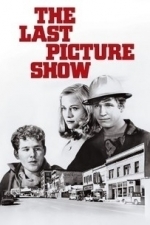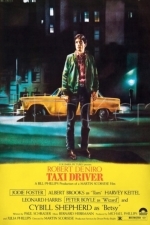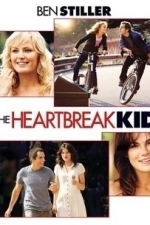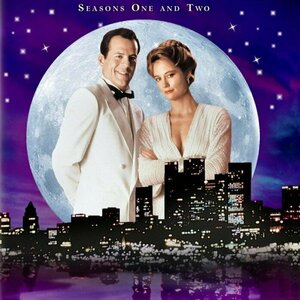Search
Search results
Zach Braff recommended The Last Picture Show (1971) in Movies (curated)
Simon Pegg recommended Taxi Driver (1976) in Movies (curated)
Joe Swanberg recommended The Heartbreak Kid (2007) in Movies (curated)
Kirk Bage (1775 KP) rated Moonlighting in TV
Aug 6, 2020
Contains spoilers, click to show
Another dip into the retro TV archive as part of that odd period in lockdown when all I could do for my watching fix was find old shows with full episodes on You Tube. My favourite show when I was a teenager happened to be one of those, with most of seasons 1 and 5 out there, and a small selection from the middle years.
If you were to make a time capsule to show aliens what the mid to late 80s looked like, look no further than this madcap rom-com drama that ran for 66 episodes between 1985 and 1989. The shoulder pads, the hairdos, the slip on shoes, the large chunks of cheesiness, it’s all there. Some of the coloured silks Maddie Hayes (Cybill Shepherd) wears have to be seen to be believed.
It was the first show to get free reign creatively from a network, with ABC trusting Glenn Gordon Carol, fresh from success with Remington Steele, to create something cool and hip. At the peak of its success it was costing $1.6m per episode, with Bruce Willis’ pay check becoming a big chunk of that, as his ego inflated and his star rose.
They auditioned close to 600 actors for the role of glib, fast talking sleuth David Addison, before taking a risk on an out of work nobody the producers had heard singing karaoke in an LA bar. The phenomenal buzz around Bruce Willis in 1985 is hard to imagine now, but he was literally the biggest star on TV, and once Die Hard came along in 1988, he gave the movie star thing a good go too.
Famous for its post-modern take on episode content, with overlapping dialogue, direct address to camera, in jokes and endless references to current events and the show itself, it was a knowingly self-conscious misfit. Nothing had ever been like this. Nothing, even close. It was funny, cool, had mass appeal and could seemingly do no wrong, breaking ratings records all over the place.
But all was not paradise on set. Shepherd and Willis were never pals, and at the worst actively despised one another, often refusing to film scenes if they thought the other one was too much the focus – which in Shepherd’s case was often a weird anachronistic soft focus, that attempted to make her look like a vintage movie star. They argued, fell out, made up and threw tantrums just like the characters they played. And scripts for the unusual hour long format were often so late, they filmed filler scenes whilst they were being finished on set!
This allowed for an unparalleled voice in American TV land. They got away with some very terse comments and innuendo bordering on smut, that slipped under the network radar, simply because the show was being edited minutes before it was shown. By season four it was really falling apart, as episodes got more surreal and used the breaking of the fourth wall more often, in a desperate attempt just to keep going.
Ostensibly, it was a detective show. But it was never about the cases. The sleuthing was only a background to the will they won’t they romance of Maddie and David, facilitated by the ever present Allyce Beasley as Agnes DiPesto, the rhyming receptionist, that was the only other cast member to appear in all 66 shows apart from the two stars. Early on the mystery plots and crimes to be solved were taken semi seriously; with a peak in season three where it actually approached proper drama. But by the end it was all about Willis goofing around, at the expense of any recognisable story.
Let’s face it, looking back on it now it has aged a whole bunch in a lot of bad ways. You aren’t really going to indulge in it for anything other than nostalgia reasons. But I was a huge, huge fan, and so for me it was a real trip to see it again. I never missed it as a kid, and would sulk if anything threatened to stop me watching it as it aired. I had every episode taped on VHS and could quote entire episodes, I had watched them so much.
It all ended too soon for me, but not soon enough for them. Shepherd got pregnant, Willis took the break to go and make some mid budget action film, and the rest is history. To this day, footage of them reminiscing about it is a fascinating but awkward watch, as they clearing still can’t agree on anything and thinly veil their contempt for each other. Willis’ ego does not come out of it well, but David Addison will always remain the one character that formed my personality via TV in those days, for better or worse.
If you were to make a time capsule to show aliens what the mid to late 80s looked like, look no further than this madcap rom-com drama that ran for 66 episodes between 1985 and 1989. The shoulder pads, the hairdos, the slip on shoes, the large chunks of cheesiness, it’s all there. Some of the coloured silks Maddie Hayes (Cybill Shepherd) wears have to be seen to be believed.
It was the first show to get free reign creatively from a network, with ABC trusting Glenn Gordon Carol, fresh from success with Remington Steele, to create something cool and hip. At the peak of its success it was costing $1.6m per episode, with Bruce Willis’ pay check becoming a big chunk of that, as his ego inflated and his star rose.
They auditioned close to 600 actors for the role of glib, fast talking sleuth David Addison, before taking a risk on an out of work nobody the producers had heard singing karaoke in an LA bar. The phenomenal buzz around Bruce Willis in 1985 is hard to imagine now, but he was literally the biggest star on TV, and once Die Hard came along in 1988, he gave the movie star thing a good go too.
Famous for its post-modern take on episode content, with overlapping dialogue, direct address to camera, in jokes and endless references to current events and the show itself, it was a knowingly self-conscious misfit. Nothing had ever been like this. Nothing, even close. It was funny, cool, had mass appeal and could seemingly do no wrong, breaking ratings records all over the place.
But all was not paradise on set. Shepherd and Willis were never pals, and at the worst actively despised one another, often refusing to film scenes if they thought the other one was too much the focus – which in Shepherd’s case was often a weird anachronistic soft focus, that attempted to make her look like a vintage movie star. They argued, fell out, made up and threw tantrums just like the characters they played. And scripts for the unusual hour long format were often so late, they filmed filler scenes whilst they were being finished on set!
This allowed for an unparalleled voice in American TV land. They got away with some very terse comments and innuendo bordering on smut, that slipped under the network radar, simply because the show was being edited minutes before it was shown. By season four it was really falling apart, as episodes got more surreal and used the breaking of the fourth wall more often, in a desperate attempt just to keep going.
Ostensibly, it was a detective show. But it was never about the cases. The sleuthing was only a background to the will they won’t they romance of Maddie and David, facilitated by the ever present Allyce Beasley as Agnes DiPesto, the rhyming receptionist, that was the only other cast member to appear in all 66 shows apart from the two stars. Early on the mystery plots and crimes to be solved were taken semi seriously; with a peak in season three where it actually approached proper drama. But by the end it was all about Willis goofing around, at the expense of any recognisable story.
Let’s face it, looking back on it now it has aged a whole bunch in a lot of bad ways. You aren’t really going to indulge in it for anything other than nostalgia reasons. But I was a huge, huge fan, and so for me it was a real trip to see it again. I never missed it as a kid, and would sulk if anything threatened to stop me watching it as it aired. I had every episode taped on VHS and could quote entire episodes, I had watched them so much.
It all ended too soon for me, but not soon enough for them. Shepherd got pregnant, Willis took the break to go and make some mid budget action film, and the rest is history. To this day, footage of them reminiscing about it is a fascinating but awkward watch, as they clearing still can’t agree on anything and thinly veil their contempt for each other. Willis’ ego does not come out of it well, but David Addison will always remain the one character that formed my personality via TV in those days, for better or worse.
BankofMarquis (1832 KP) rated Taxi Driver (1976) in Movies
Sep 10, 2020
Perfect blend of Director, Star and Place
Dark, dirty, rainy, dangerous, foggy, grimy, glorious - all words that would describe New York City in the late 1960's/early 1970's.
They are also words that would describe Martin Scorcese's 1976 film, TAXI DRIVER starring Robert DeNiro (fresh off his Oscar win for Godfather II) in another Oscar nominated performance.
This film is a perfect blend of Director, star and material. These 3 elements come together to blend a vivid portrayal of an outsider/loner observing the decay of the city he loves, finally culminating in his desire to correct some of the wrongs.
I still don't know if I'm talking about Travis Bickle, the character DeNiro is playing, or of Director Scorcese.
DeNiro is powerful in his portrayal of the titular Taxi Driver, Travis Bickle. He subtly underplays the character - especially at the beginning - showing a lost soul wandering the big city. Slowly, this character begins to gain his footing - and that footing is terrifying in the violence that is welling up in him. He has no social attachments - and the 2 that he attempts to gain during the course of this film slips through his grasp the harder he tries to clutch them.
Jodie Foster was Oscar nominated for her turn as 13 year old street walker Iris. It is a stunningly strong performance by an young actress who heretofore was known only for lighthearted "Disney-type" films and shows the strength of character and performer that Foster would become. Albert Brooks and Peter Boyle pop up in this film in somewhat comic-relief roles. Roles that are a needed, and welcome, change of pace for this film. As opposed to Harvey Keitel as "Sport" the pimp of Foster's character. You can sense that he is just as dangerous as Bickle and if these two were to go up against each other, violence is going to erupt.
The surprise of this movie for me was the performance of Cybill Shepherd as Betsy, the object of Travis' desire. She brings a power and grace to her role that is extremely attractive to watch. You are drawn to Betsy and can understand how Travis is drawn to her as well.
But, make no mistake, this is Scorcese's film. He captures the feel of New York City of this time. This film is mostly mood and atmosphere - and that is a good thing. You get the sense that you are there. This film is a time capsule of the "Mean Streets" times of NYC - and shows a Director that knows this city and knows how he wants to show it on film. I was shocked to find out that Scorcese was NOT nominated for an Oscar for his work here, it is that good.
I also was surprised to find that the great Bernard Herrmann (Citizen Kane, Psycho, Vertigo) was the Composer of the film - and he is a great choice. His music perfectly matches - and enhances - the mood that is set up by Scorcese. This film would not be as atmospheric - or would capture the vibe of the time - without Herrmann's score. Unfortunately, Herrmann would pass away shortly after completing his work on this film, so his Oscar nomination was posthumous.
A wonderful blend of character, place and mood. Taxi Driver is timeless because it is about a specific time.
Letter Grade: A
9 stars (out of 10) - and you can take that to the Bank(ofMarquis)
They are also words that would describe Martin Scorcese's 1976 film, TAXI DRIVER starring Robert DeNiro (fresh off his Oscar win for Godfather II) in another Oscar nominated performance.
This film is a perfect blend of Director, star and material. These 3 elements come together to blend a vivid portrayal of an outsider/loner observing the decay of the city he loves, finally culminating in his desire to correct some of the wrongs.
I still don't know if I'm talking about Travis Bickle, the character DeNiro is playing, or of Director Scorcese.
DeNiro is powerful in his portrayal of the titular Taxi Driver, Travis Bickle. He subtly underplays the character - especially at the beginning - showing a lost soul wandering the big city. Slowly, this character begins to gain his footing - and that footing is terrifying in the violence that is welling up in him. He has no social attachments - and the 2 that he attempts to gain during the course of this film slips through his grasp the harder he tries to clutch them.
Jodie Foster was Oscar nominated for her turn as 13 year old street walker Iris. It is a stunningly strong performance by an young actress who heretofore was known only for lighthearted "Disney-type" films and shows the strength of character and performer that Foster would become. Albert Brooks and Peter Boyle pop up in this film in somewhat comic-relief roles. Roles that are a needed, and welcome, change of pace for this film. As opposed to Harvey Keitel as "Sport" the pimp of Foster's character. You can sense that he is just as dangerous as Bickle and if these two were to go up against each other, violence is going to erupt.
The surprise of this movie for me was the performance of Cybill Shepherd as Betsy, the object of Travis' desire. She brings a power and grace to her role that is extremely attractive to watch. You are drawn to Betsy and can understand how Travis is drawn to her as well.
But, make no mistake, this is Scorcese's film. He captures the feel of New York City of this time. This film is mostly mood and atmosphere - and that is a good thing. You get the sense that you are there. This film is a time capsule of the "Mean Streets" times of NYC - and shows a Director that knows this city and knows how he wants to show it on film. I was shocked to find out that Scorcese was NOT nominated for an Oscar for his work here, it is that good.
I also was surprised to find that the great Bernard Herrmann (Citizen Kane, Psycho, Vertigo) was the Composer of the film - and he is a great choice. His music perfectly matches - and enhances - the mood that is set up by Scorcese. This film would not be as atmospheric - or would capture the vibe of the time - without Herrmann's score. Unfortunately, Herrmann would pass away shortly after completing his work on this film, so his Oscar nomination was posthumous.
A wonderful blend of character, place and mood. Taxi Driver is timeless because it is about a specific time.
Letter Grade: A
9 stars (out of 10) - and you can take that to the Bank(ofMarquis)



